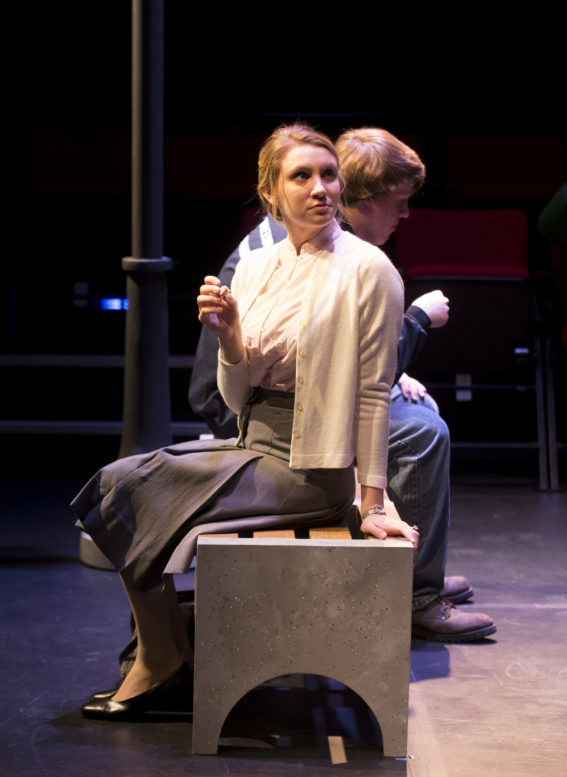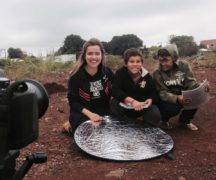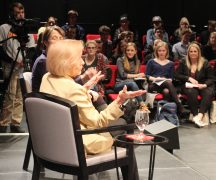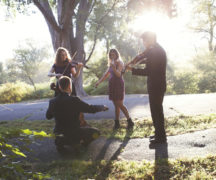By DAVID DUPONT
BG Independent News
Middletown, the setting and namesake for the new theater production on campus, doesn’t have much to recommend it.
Even the indigenous people passed through leaving little mark. A statue of a horse is the only tourist attraction, unless you, like tour guide (Christa Federico), count the air. That air, she says, contains bits of people, dust and objects that went before. That seems pretty heavy philosophizing for a tour guide, but Middletown seems to do that to people. They say things that rise deep from their psyches, and those psyches are often troubled.
Eavesdropping, the local car mechanic (Danny Miskell) hears Mary (Mackenzie Baumhower) say she and her husband are starting a family. Don’t have an only child, he blurts out. Whenever you hear childish noises, it’s always that same child.
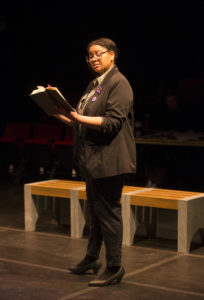
Bessie D. Smith plays the librarian in”Middletown.”
Even the librarian, the sane presence at the heart of this troubled town and the play, is given to disturbing observations. When Mary says she’d like to get a library card, the librarian played by Bessie D. Smith says: “Good for you. Most people think ‘I’m going to die anyway, so why bother.’”
That sense of mortality, and the search for some kind of meaning in life pervades “Middletown.” The Will Eno play, directed by Jonathan Chambers, opens tonight at 8 and with shows Friday and Saturday at 8 p.m. and Saturday and Sunday at 2 p.m. continuing Feb. 25, 26 and 27 at 8 p.m. and Feb. 27 at 2 p.m. Tickets $15 and $5 for students and children in advance from www.bgsu.edu/arts and by calling 419-372-8171. All tickets are $20 on the day of the show.
Mary’s visit to the library is what precipitates what stands for a plot here. But the plot like the character’s relationships with each other is as much about missed connections and fleeting interactions as narrative. They are like so many molecules bouncing around within the confines of the stage. Sometimes they even bounce out. The cop (Noah Froelich) is aware as he abuses a man that the audience is witness to his actions. There’s a fake intermission, where we meet five theatergoers (Madison Zavitz, Logan Richardson, Braeden Glenn Tuttle, Janina Koehl Bradshaw, and Paige Dooley) with their own motivations for engaging in this show.
Even the most tenuous action can be suspended as with by bit with the tour guide and two tourists. At one point the tourist (Richardson) says to the tour guide: “Let me get quick picture of you being wrong.” Or when the librarian, a nameless archetype, expounds on a recently returned book. She’s as taken with the traces left by a young reader as by the subject of the book. The girl wrote cryptic notes in pink and used a barrette as a bookmark.
Awareness that Middletown is just a blur within the cosmos is evident, no more so then in the scene where we meet the town celebrity, the astronaut (Baxter Chambers). From his capsule set dramatically in the middle of the stage, the astronaut expounds of the beauty of the view from space, but also recollects the petty incident in which the mechanic approached him with a rock he believed to be a meteor. Not so, the astronaut said, not the least concerned about the disappointment that judgment causes. The mechanic had hoped the rock would be his path to fame, even a spot on the local news.
Mary and her husband do start a family. But he remains off-stage. We never see him, and Mary apparently sees him little as well giving her pregnancy the sense of being a virgin conception.
At the library she strikes up a conversation with John Dodge (Harmon R. Andrews), the local handyman whose curiosity wanders from subject to subject, seeking as a much an answer to why he’s even interested in gravity, for example.
And while he and Mary seem interest in friendship, they never do quite connect.
These little tensions play out in incidents more than plot, more anecdotes than narrative. People ponder the confusions of their lives out, sometimes in off-beat witty language and other times, in platitudes.
Sometimes their passive natures and random outbursts are trying, and a sense of resolution seems to elude Eno’s pen. Yet the cast does well to make us care about these people.
Miskell and Andrews give their characters relatable regular guy surfaces that are at odds with the turmoil beneath. Froelich’s cop is creepy, cynical, yet still a bit of a dreamer.
Smith’s librarian is compassionate, all-knowing, a beloved aunt who is also a deep thinker.
Mary is a lost soul, not understanding why she is in Middletown. Baumhower brings warmth to her character’s sense of confusion. The way she carries her body and her facial expressions reflect the toll of her pregnancy. Towards the end she is frighteningly vulnerable.
The progress of Mary’s pregnancy is as much forward momentum as we get. That can give the sense that we are like that man in the podcast about black holes that Mary listens to. He keeps falling and falling and falling inside the black hole, as earthly life goes on.
The play opens with an elaborate greeting, delivered by Chambers. The play is for all kinds of folks, he says. It’s a Whitmanesque list for the 21st century. Even in those early moments of the play one description stood out without my realizing how fitting it would be to experiencing “Middletown.” The play is for, he says, “those whose eyes are tired of trying to find something in everything.”

